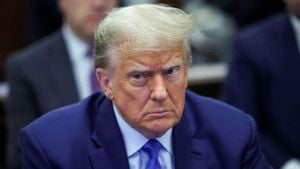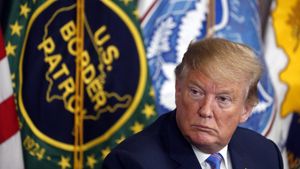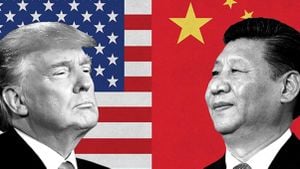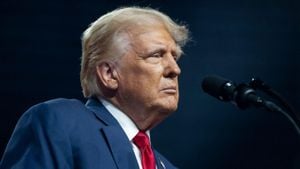Robert F. Kennedy Jr., long known as the son of the former U.S. Attorney General and nephew of President John F. Kennedy, has evolved over the years from being recognized primarily for his family's legacy to becoming one of the most vocal critics of vaccines. His stance against vaccinations, particularly during the COVID-19 pandemic, has sparked wide-ranging discussions and controversies, shaping public opinion on vaccines across various demographics.
The pandemic served as both a catalyst and platform for Kennedy's views to reach wider audiences, emphasizing vaccine skepticism during a time when public health was under intense scrutiny. He founded the non-profit organization Children’s Health Defense, which actively campaigns against vaccines along with other health interventions. This organization's outreach and persistent messaging have galvanized communities skeptical of the established health narrative.
Many parents, primarily those who already felt uncertain about vaccines, found Kennedy's arguments resonate, reinforcing their concerns. According to Edward W. Merlino, director of the Center for Vaccine Research at the University of Maryland, Kennedy's prominence has led to increased vaccine hesitancy, especially among younger parents. 'He’s framing the conversation around vaccine safety and rights, which can be very appealing to parents who feel more empowered when they question authority,' Merlino noted.
While Kennedy claims his motives are rooted in concern for health and freedom, critics argue his rhetoric is deeply irresponsible, especially during a global health crisis. Opponents have pointed out the danger of spreading misinformation, particularly when it could impact public health initiatives aimed at controlling diseases through vaccination. The sheer volume of vaccine hesitance spurred by figures like Kennedy is believed to have consequences for herd immunity and overall public health.
Data from the Centers for Disease Control and Prevention (CDC) indicates fluctuations in vaccination rates, particularly among childhood vaccines, coinciding with the heightened visibility of anti-vaccine sentiments. Reports suggest states with higher visibility of anti-vaccine campaigning experience lower vaccination rates. During 2021, some areas saw their vaccination rates dip below what public health officials would deem safe.
For example, according to statistics shared by the CDC, states such as Idaho and Mississippi have shown concerning decreases. These declines have been propelled, at least partially, by well-organized anti-vaccine movements. Specialists fear these developments will lead to outbreaks of diseases once under control, much like the resurgence of measles seen recently.
While discussing Kennedy's impact, it's important to note the role of social media platforms. Platforms like Facebook, Instagram, and Twitter have provided him and others like him with expansive reach, enabling them to disseminate their views rapidly. Studies show the viral nature of misinformation — backed by social media algorithms prioritizing engagement — creates echo chambers where skeptical views proliferate.
This issue hit close to home for Emory University sociologist Dr. Anna Lewis, who has researched the nutritional and health impacts of misinformation. 'The online community surrounding vaccine hesitancy is complex. People feel connected to others who share their concerns, which amplifies the sense of mistrust and fear,' she stated.
Kennedy's influence is not just restricted to social media but has permeated mainstream media as well. During public appearances and interviews, he employs emotional appeals, drawing on personal anecdotes and evoking historical precedents of civil liberties eroded during public health emergencies. His narratives often interweave the themes of personal freedom versus public health, creating tension among audiences.
Despite the evidence supporting vaccine efficacy and safety cited by public health officials, Kennedy's rhetoric challenges the narrative federal health institutions push, causing some people to rethink their positions on vaccination. This skepticism can turn individuals who might have been hesitant but willing to vaccinate, locking them away from necessary immunization and public health recommendations.
Kennedy's run for the presidency has also galvanized debates surrounding vaccine policies and mandates, as he vows to put freedom of choice at the forefront of healthcare. He advocates for informed consent and mandates against vaccinations, pledging to stir significant political discourse around public health approaches should he secure the nomination.
Some analysts suggest Kennedy's candidacy and associated rhetoric could become pivotal, especially among libertarian and conservative groups who lean toward questioning government intervention. His campaign serves as both a platform for his views on vaccines and as a rallying point for like-minded individuals skeptical of authority.
Political polarization surrounding vaccine mandates has significantly increased, breaking down along ideological lines. Democratic lawmakers have historically supported vaccination mandates, citing public health and community safety, whereas many Republican officials, echoing sentiments voiced by Kennedy, have pushed for personal choice.
The effects of Kennedy’s activism on global vaccination strategies remain to be seen, but healthcare professionals and political analysts are watching closely. Public health experts stress the importance of addressing misinformation head-on and engaging with communities skeptical of vaccines to redirect the narrative surrounding inoculations.
Engagement from educational and governmental bodies is deemed critically important to counteract the damaging effects of vaccine misinformation. Initiatives aimed at fostering open dialogues with communities can help alleviate fears surrounding vaccine safety.
At the heart of this struggle lies the balance between public health imperatives and individual rights—a debate deeply entwined with Robert F. Kennedy Jr.'s influence on vaccination rates across the United States. Regardless of his intention, the ramifications of his movement and campaigns will bear considerable weight on the future of vaccination efforts, which could shift the collective consciousness of public health for years to come.



